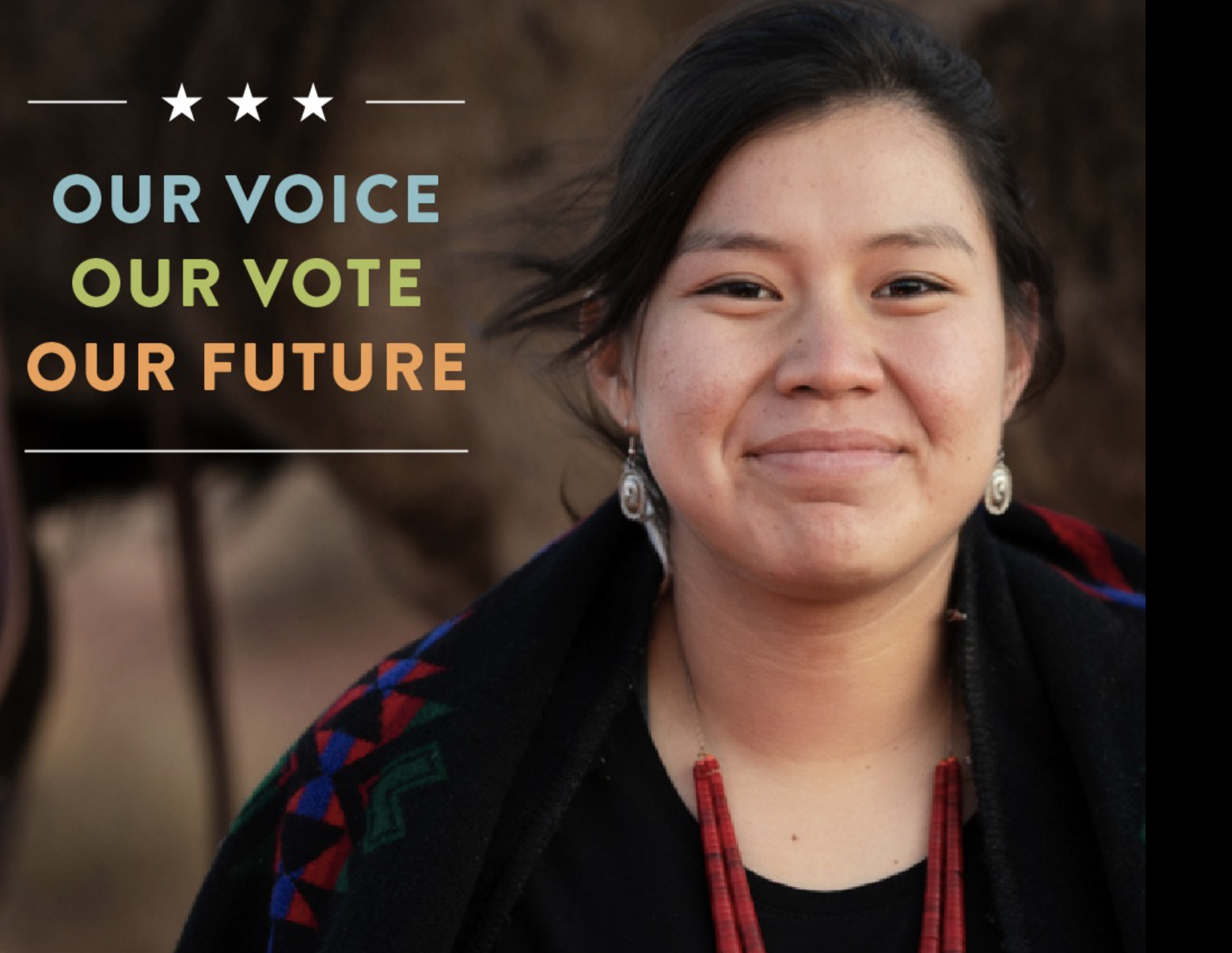
- Details
- By Anathea Chino
Guest Opinion. Native Vote 2024. With Election Day in just over a week away, voters in critical swing states like Arizona, Michigan, Wisconsin, Montana, and Georgia are making their final decisions. These states will likely decide which ticket secures the 270 electoral votes needed to win the presidential race. Once again, the Native vote could be the deciding factor.
In 2020, Native American voters played a key role in electing President Biden, tipping the scales in battleground states such as Arizona, Michigan, Nevada, and Wisconsin. In 2018, Native voters were pivotal in re-electing Montana Senator Jon Tester, who now faces another tight race. These examples, along with other down-ballot successes, show how Native voters have impacted elections where our population exceeds the margin of victory.
In Arizona, more than 319,000 Native Americans and Alaska Natives are of voting age; in Michigan, over 100,000 are eligible to vote—four times the size of the margin of former President Trump’s victory in 2016. Nationwide, there are nearly 6.8 million Native American and Alaskan Natives living in the United States, with approximately 4.7 million eligible to vote.
Native communities are more than ready to cast our ballots. Despite ongoing efforts to suppress our votes, we are determined to make our mark. Our June survey, conducted in partnership with Lake Research Partners and Two Feathers Consulting, found that an overwhelming 79% of Native voters are likely to vote this November. This readiness comes even as we face significant hurdles—from polling locations located far from reservations to restrictive voter ID laws that refuse to recognize tribal identification cards.
And yet Native communities are not deterred. Across the country, our relatives are organizing to break down these barriers, ensuring that every eligible Native voter has the resources, information, and support needed to fully participate in the electoral process. Whether it’s through grassroots efforts, legal challenges, or voter mobilization drives, we are reclaiming our right to be heard.
Our votes won’t just count; they will decide elections. Native voters have the power to shape the outcome of this election—and we intend to make that power known.
With that power comes responsibility. The organization that I co-founded and lead, Advance Native Political Leadership (Advance), is building power in Native communities through leadership recruitment and support, civic engagement, data and research, and state and national coordination. While our mission is to increase Native representation at all levels of government, we see the inclusion of Minnesota Gov. Tim Walz on the presidential ticket as a historic opportunity for Indian Country.
That’s why Advance has endorsed Vice President Kamala Harris and Gov. Walz to lead the country. This is our first-ever endorsement of non-Native candidates, and we made it for three key reasons.
First, Gov. Walz’s partnership and legislative record in Minnesota with Lt. Gov. Peggy Flanagan (White Earth Ojibwe), a co-founder of Advance, demonstrates his deep commitment to the unique status of Tribal Nations. From ensuring Tribal input on policy to changing Minnesota's state flag to reflect Dakota heritage, their leadership in Minnesota has created greater opportunities for Native communities.
Second, inclusive leadership benefits everyone. The Walz-Flanagan administration has expanded education access, implemented paid family leave, and set Minnesota on a path to 100% carbon-free energy by 2040. They also passed a $1B affordable housing bill to fight homelessness and expand homeownership. These policies are proof that when Native communities thrive, everyone wins.
Finally, Lt. Gov. Peggy Flanagan is poised to become the nation’s first Native woman governor. Her election would not only set a powerful precedent for Native representation in Minnesota, it would also resonate across the country, amplifying the voices and concerns of Indigenous peoples on the national stage. Representation matters—it’s transformative. When we see ourselves reflected in leadership, we are inspired to believe in our own potential to influence change. At Advance, we see firsthand how breaking barriers opens doors for entire communities, proving that when we engage in politics, we can redefine what’s possible for future generations.
This election, Native Americans, Alaska Natives, and Native Hawaiians have a historic opportunity to shape the future. By casting our ballots, we can build a more inclusive, just, and empowered future for all of our communities.
Our vote matters. We have the power to decide this election—and the future of our country.
Anathea Chino (Acoma Pueblo) is a co-founder and the executive director of Advance Native Political Leadership, the first and only national Native organization aimed at addressing the underrepresentation of Native Americans in local and state elected leadership.
Help us defend tribal sovereignty.
At Native News Online, our mission is rooted in telling the stories that strengthen sovereignty and uplift Indigenous voices — not just at year’s end, but every single day.
Because of your generosity last year, we were able to keep our reporters on the ground in tribal communities, at national gatherings and in the halls of Congress — covering the issues that matter most to Indian Country: sovereignty, culture, education, health and economic opportunity.
That support sustained us through a tough year in 2025. Now, as we look to the year ahead, we need your help right now to ensure warrior journalism remains strong — reporting that defends tribal sovereignty, amplifies Native truth, and holds power accountable.
 The stakes couldn't be higher. Your support keeps Native voices heard, Native stories told and Native sovereignty defended.
The stakes couldn't be higher. Your support keeps Native voices heard, Native stories told and Native sovereignty defended.
Stand with Warrior Journalism today.
Levi Rickert (Potawatomi), Editor & Publisher

